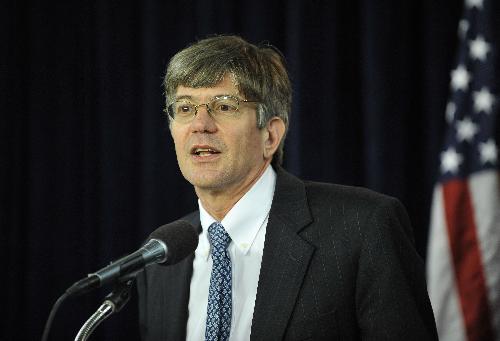WASHINGTON, March 29 (Xinhua) -- The United States on Monday reaffirmed its commitment to the one-China policy, saying that it' s a commitment that should be the bedrock of the foundation of its relationship with China.
"The U.S. position on one-China policy is unchanged," Deputy Secretary of State James Steinberg said at a briefing at the Foreign Press Center in downtown Washington D.C..

U.S. Deputy Secretary of State James Steinberg speaks at a briefing at the Foreign Press Center in downtown Washington D.C., capital of the United States, March 29, 2010. The United States on Monday reaffirmed its commitment to the one-China policy, saying that it's a commitment that should be the bedrock of the foundation of its relationship with China. (Xinhua/Zhang Jun)
The deputy secretary made the remarks in response to a question about whether the Obama administration remains committed to the one-China policy and the principles of the three China-U.S. joint communiques.
"It (the one-China policy) serves us very well. We have consistently through Democratic and Republican administrations understood those agreements and principles be the foundation of building an ever stronger relationship (with China)," Steinberg said.
"So there is no change. It's a commitment that we understand be the bedrock of the foundation of the relationship between the two countries," he added.
The deputy secretary appeared to be quite positive about U.S.- China relationship despite recent troubles between the two countries caused by the announcement of new U.S. arms sales to Taiwan in January and President Barack Obama's meeting with the Dalai Lama in February.
"I think it is fair to say for the first 15 months of the new administration here, U.S.-China relations have been extremely constructive," Steinberg said in his opening remarks at the briefing.
"I think we avoided the dangers of transition that often happen in our relations with China and were able to start a very stable and promising course on our relationships, beginning with a phone call between (Chinese) President Hu (Jintao) and President Obama in February of last year, their meeting in London at the G-20 in April and culminating in President Obama's visit to China last fall," he said.
At the levels of the Cabinet, he said, the two sides have seen the deepening of bilateral ties through the creation of the Strategic and Economic Dialogue (S&ED), which really reflects both the breadth and the depth of U.S.-China relationship.
Steinberg said he knew that in recent months there's been speculation about whether there's been a change in U.S.-China relationship because of differences between the two sides on issues related to Taiwan, Tibet, as well as economic and trade policy.
He said his trip to China early this month, along with National Security Council Senior Director for Asian Affairs Jeffrey Bader, provided a chance for both sides to discuss how to build on strong bilateral dialogue to seize the opportunities in the relationship and the need for the two countries to work together, as well as to manage their differences.
During the trip, Steinberg said, the U.S. side had made clear that it does not support "Taiwan independence," welcomes recent improvements in cross-strait relations and hopes that the improvements will continue and expand.
He added that the U.S. side had also reaffirmed its position that it does consider Tibet to be a part of China and does not support "Tibet independence."
Steinberg said the two sides also discussed issues in economics and trade as well as security issues, such as the nuclear issues of the Korean Peninsula and Iran. |

